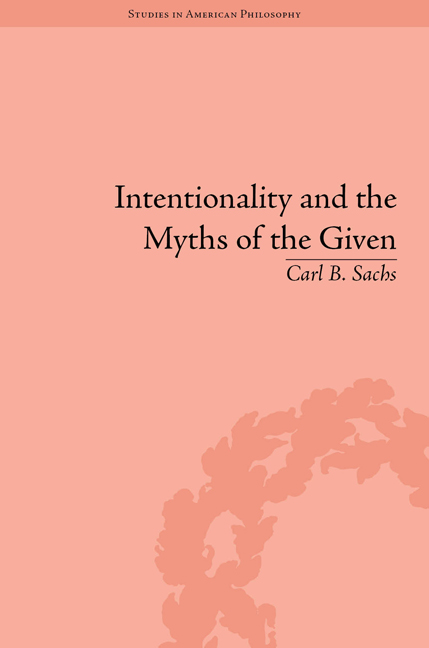Book contents
- Frontmatter
- Contents
- Acknowledgements
- Introduction: Why a New Account of Intentionality?
- 1 Intentionality and the Problem of Transcendental Friction
- 2 The Epistemic Given and the Semantic Given in C. I. Lewis
- 3 Discursive Intentionality and ‘Nonconceptual Content’ in Sellars
- 4 The Retreat from Nonconceptualism: Discourse and Experience in Brandom and McDowell
- 5 Somatic Intentionality and Habitual Normativity in Merleau-Ponty's Account of Lived Embodiment
- 6 The Possibilities and Problems of Bifurcated Intentionality
- Conclusion
- Appendix: Is Phenomenology Committed to the Myth of the Given?
- Works Cited
- Notes
- Index
Conclusion
- Frontmatter
- Contents
- Acknowledgements
- Introduction: Why a New Account of Intentionality?
- 1 Intentionality and the Problem of Transcendental Friction
- 2 The Epistemic Given and the Semantic Given in C. I. Lewis
- 3 Discursive Intentionality and ‘Nonconceptual Content’ in Sellars
- 4 The Retreat from Nonconceptualism: Discourse and Experience in Brandom and McDowell
- 5 Somatic Intentionality and Habitual Normativity in Merleau-Ponty's Account of Lived Embodiment
- 6 The Possibilities and Problems of Bifurcated Intentionality
- Conclusion
- Appendix: Is Phenomenology Committed to the Myth of the Given?
- Works Cited
- Notes
- Index
Summary
The book began with several inter-related questions concerning what must be done to have a philosophically adequate conception of intentionality. One criterion imposed on that conception was that it must not fall afoul of the Myth of the semantic Given. I also argued that we need such a conception in order to satisfy the demand for transcendental friction. In meeting this demand, I showed that several of the major philosophers considered here – Lewis, Sellars and McDowell – were not able to meet this demand in entirely satisfactory ways. Although Lewis and Sellars adopted from the tradition of American pragmatism an inferentialist and holistic conception of conceptual content, and both were concerned to avoid idealism, neither was able to do so in a wholly adequate way. By contrast, McDowell sought to accommodate ‘friction’ within the conceptual domain rather than outside of it, but in doing so he overlooks the resources in phenomenology of embodiment for a version of nonconceptualism that avoids the Myth of the semantic Given.
By contrast, the account of bifurcated intentionality satisfies the demand for transcendental friction by accepting an account of discursive intentionality drawn from Lewis, Sellars, but especially Brandom, and complementing that account with an account of somatic intentionality drawn from Merleau-Ponty.
- Type
- Chapter
- Information
- Intentionality and Myths of the GivenBetween Pragmatism and Phenomenology, pp. 155 - 156Publisher: Pickering & ChattoFirst published in: 2014



